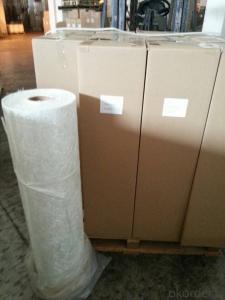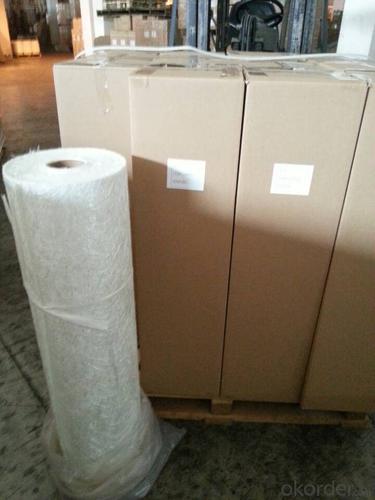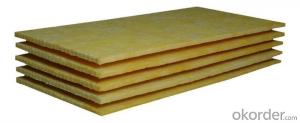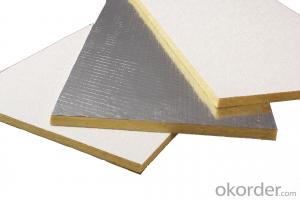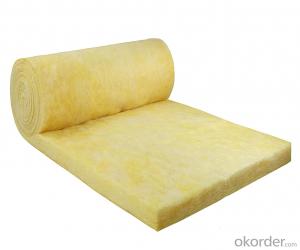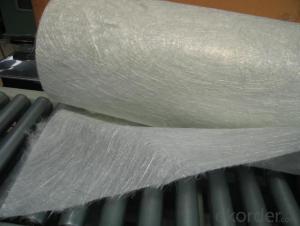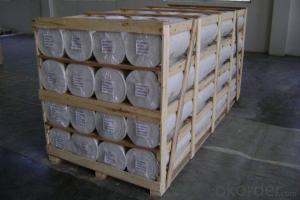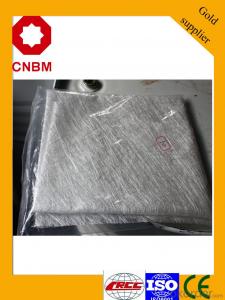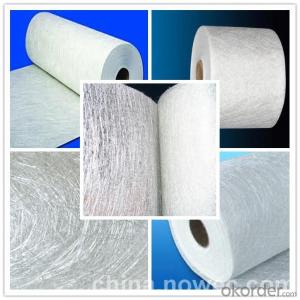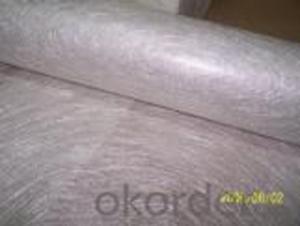C glass Chopped Strand Mat- High Quality CCSM
- Loading Port:
- Shanghai
- Payment Terms:
- TT OR LC
- Min Order Qty:
- 1000 kg
- Supply Capability:
- 100000 kg/month
OKorder Service Pledge
OKorder Financial Service
You Might Also Like
Product description of Fiber Glass Powder Emulsion Chopped Strand Mat
Glass Fiber Emulsion Binder Chopped Strand Mat is an unwoven fabrics consisting of randomly distributed chopped strands held together with Emulsion Binder.
Emulsion Binder Chopped Strand Mats are compatible with unsaturated polyester, vinyl ester, phenol and epoxy resins.
The products are widely used in hand lay-up process and can also be used in compression molding and continuous laminating process and hand layup process. The typical end-use applications include various panels, boats, bathroom accessories, automotive parts and cooling towers.
Specification of Emulsion Binder E-Glass Chopped Strand Mat
Property | Glass type | Weight(g/m2) | Width 200~3300 | Roll Weight | Moisture Content /% | Combustible Content /% | Breakage Strength /N |
Test Method | GB/T 1549 | ISO3374:2000 | ISO3374 | GB/T17470-1998 | ISO3344:1997 | ISO1887:1995 | ISO3342 |
CMC 80 | C-GLASS | 80±16 | ±5 | 6~50 | <0.2< span=""> | 13.6±0.35 | ≥200 |
CMC 100 | C-GLASS | 100±10 | ±5 | 6~65 | <0.2< span=""> | 9.5±0.35 | ≥170 |
CMC 150 | C-GLASS | 150±15 | ±5 | 6~97 | <0.2< span=""> | 8.0±0.35 | ≥40 |
CMC 225 | C-GLASS | 225±22 | ±5 | 6~150 | <0.2< span=""> | 5.0±0.6 | ≥60 |
CMC 300 | C-GLASS | 300±30 | ±5 | 6~180 | <0.2< span=""> | 4.0±0.6 | ≥90 |
CMC 450 | C-GLASS | 450±45 | ±5 | 6~180 | <0.2< span=""> | 3.8±0.6 | ≥120 |
CMC 600 | C-GLASS | 600±60 | ±5 | 6~240 | <0.2< span=""> | 3.6±0.6 | ≥150 |
CMC 900 | C-GLASS | 900±90 | ±5 | 6~190 | <0.2< span=""> | 3.4±0.6 | ≥180 |
Characteristics of Emulsion Binder C Glass Chopped Strand Mat
1.Uniform density ensures consistent fiberglass content and mechanical properties of the composites products;
2.Uniform powder distribution ensures good mat integrity, little loose fibers and small roll diameter;
3.Excellent flexibility ensures good mold ability with no spring back at sharp angles;
4.Fast and consistent wet-out speed in resins and rapid air lease reduce resin consumption and production cost, and enhances productivity and mechanical properties of the end products.
FAQ:
Why Choose us?
CNBM is a stated own company, provide the guarantee for the best quality, best service and safety business.
- Q: How does the cost of fiberglass mat tissue compare to other reinforcement materials?
- The cost of fiberglass mat tissue is generally lower compared to other reinforcement materials such as carbon fiber or Kevlar.
- Q: Can fiberglass mat tissue be used for insulation in cold environments?
- Indeed, fiberglass mat tissue is a viable option for insulation purposes in frigid settings. Fiberglass, renowned for its remarkable thermal characteristics, is frequently employed as an insulating material. Its capacity to hinder heat transfer is owed to its low thermal conductivity, effectively ensuring insulation in cold environments. Tailored specifically for thermal insulation, fiberglass mat tissue is commonly utilized in various applications such as walls, roofs, and floors to thwart heat dissipation and maintain a cozy indoor temperature. Moreover, fiberglass boasts resistance to moisture and exhibits durability, rendering it impervious to degradation and loss of insulating properties in cold and damp conditions. Consequently, fiberglass emerges as an apt choice for insulation in cold environments.
- Q: What are the main applications of fiberglass mat tissue?
- Fiberglass mat tissue, an adaptable material, finds diverse applications in industries like construction, automotive, aerospace, and marine. Key uses of this material comprise: 1. Construction: Fiberglass mat tissue commonly reinforces and strengthens building materials in the construction industry, including roofing shingles, wallboards, and cementitious products. It enhances tensile strength and durability, rendering the structures more resistant to cracks, water damage, and weathering. 2. Automotive: The manufacturing of automotive parts, such as dashboards, door panels, and trunk liners, heavily relies on fiberglass mat tissue. It imparts structural integrity, sound insulation, and heat resistance, contributing to safer and more comfortable vehicles. 3. Aerospace: Lightweight composite materials used in aircraft structures benefit from the inclusion of fiberglass mat tissue. This material aids in reducing overall weight, improving fuel efficiency, and enhancing performance. 4. Marine: Fiberglass mat tissue plays a significant role in boat and shipbuilding. It provides strength, stiffness, and resistance to water and corrosion in the construction of hulls, decks, and other components. Its lightweight, durability, and low maintenance requirements make it preferable to traditional materials like wood. 5. Electrical and Electronics: Fiberglass mat tissue serves electrical insulation purposes, such as transformer boards, electrical cabinets, and switchgear. Its excellent dielectric properties, heat resistance, and mechanical strength ensure the safety and reliability of electrical equipment. 6. Filtration: Various filtration applications, such as air filters, water filters, and oil filters, employ fiberglass mat tissue. It acts as a filtration medium, capturing and eliminating impurities, dust, and particles from air, water, or oil, thereby enhancing the quality and purity of filtered substances. In summary, fiberglass mat tissue finds extensive use across industries due to its strength, durability, lightweight nature, and resistance to environmental factors. Its versatility enables it to be an indispensable component in diverse applications, contributing to the development of safer, sturdier, and more efficient products.
- Q: Is fiberglass mat tissue resistant to vibrations?
- Yes, fiberglass mat tissue is resistant to vibrations. Fiberglass is known for its high tensile strength and durability, which allows it to withstand mechanical stress and vibrations. The fibers in the mat tissue are tightly woven together, providing excellent strength and stability. This makes fiberglass mat tissue an ideal material for applications where vibrations are a concern, such as in the construction of buildings, aerospace industry, and automotive industry. Additionally, fiberglass mat tissue has good insulation properties, which further enhances its ability to resist vibrations.
- Q: What is the expected lifespan of fiberglass mat tissue in chemical storage applications?
- The expected lifespan of fiberglass mat tissue in chemical storage applications can vary depending on factors such as the specific chemicals being stored, the conditions of storage (temperature, humidity, etc.), and the quality of the fiberglass material. However, fiberglass mat tissue is generally known for its durability and resistance to corrosion, making it suitable for long-term use in chemical storage applications. With proper maintenance and care, it can typically last for many years.
- Q: What are the different finishing options available for fiberglass mat tissue?
- Some of the different finishing options available for fiberglass mat tissue include: resin coating, heat treatment, laminating, and surface texturing. These options can enhance the strength, durability, and appearance of the fiberglass mat tissue based on specific requirements and applications.
- Q: Can fiberglass mat tissue be used for acoustic panels?
- Acoustic panels can utilize fiberglass mat tissue for sound absorption. This lightweight material is commonly employed for insulation purposes and is known for its exceptional sound-absorbing properties. By effectively reducing noise levels, it enhances the functionality of acoustic panels. Moreover, fiberglass mat tissue is a preferred choice for DIY projects due to its ease of use. However, it is crucial to consider other factors such as panel design, thickness, density, and installation method to maximize the effectiveness of acoustic panels. Therefore, consulting experts or conducting thorough research is recommended to determine if fiberglass mat tissue is suitable for your specific acoustic panel requirements.
- Q: Can fiberglass mat tissue be used for repairing fiberglass bathtubs?
- Yes, fiberglass mat tissue can be used for repairing fiberglass bathtubs. It is commonly used as a reinforcement material in fiberglass repairs, providing added strength and durability to the repaired area. The tissue can be easily applied and works well for repairing cracks, chips, or other damage on fiberglass bathtubs.
- Q: Can fiberglass mat tissue be used for making lightweight flooring?
- Making lightweight flooring is possible with the use of fiberglass mat tissue. This material is commonly found in the construction and manufacturing industries due to its strength, durability, and lightweight properties. It is created by bonding fine fiberglass strands together with a binder, resulting in a thin, flexible, and lightweight material. Using fiberglass mat tissue for flooring applications offers various advantages. Firstly, its lightweight nature makes it easy to handle and install, reducing the overall weight of the flooring system. This is particularly beneficial in situations where weight is a concern, such as in aircraft or mobile homes. Additionally, fiberglass mat tissue has an excellent strength-to-weight ratio, making it perfect for creating lightweight yet strong flooring. It reinforces and improves the structural integrity of the flooring, making it more resistant to cracking, warping, and other types of damage. Moreover, fiberglass mat tissue is resistant to moisture, chemicals, and fire, making it suitable for areas where these factors are present, such as bathrooms, kitchens, or industrial settings. It also provides good insulation properties, which helps maintain a comfortable indoor environment and reduces energy consumption. In conclusion, fiberglass mat tissue is an excellent choice for creating lightweight flooring due to its strength, durability, moisture resistance, and insulation properties. However, it is important to consider additional factors, such as the specific requirements of the flooring application, load-bearing capacity, and necessary certifications or standards before finalizing the use of fiberglass mat tissue in a flooring project.
- Q: How does fiberglass mat tissue contribute to the strength and durability of composite materials?
- The strength and durability of composite materials are greatly enhanced by fiberglass mat tissue. To begin with, the mat tissue acts as a reinforcement element, providing added strength and rigidity to the composite structure. The fibers in the mat tissue are usually made of glass, which possesses high tensile strength and stiffness. These fibers are arranged randomly, forming a three-dimensional network that evenly distributes stress throughout the composite material. This network of fibers helps to resist cracks and fractures, thus increasing the overall strength of the composite. Additionally, the mat tissue serves as a protective barrier against delamination, a common problem in composite materials. Delamination refers to the separation of layers within the composite, which can weaken its structural integrity. By bonding the layers together and improving their adhesion, the fiberglass mat tissue prevents delamination. This enhanced adhesion reduces the chances of interface failure and improves the overall durability of the composite material. Moreover, fiberglass mat tissue contributes to the improved impact resistance of composite materials. The random fiber orientation within the mat tissue creates a crisscross pattern that enhances the composite's ability to absorb and distribute impact energy. This characteristic makes the material less susceptible to damage from external forces, such as impacts, vibrations, or mechanical stress. In conclusion, fiberglass mat tissue plays a vital role in strengthening and enhancing the durability of composite materials. Its reinforcement capabilities, delamination prevention, and improved impact resistance make it an essential component in various industries, including automotive, aerospace, construction, and marine, where the demand for strong and durable materials is critical.
Send your message to us
C glass Chopped Strand Mat- High Quality CCSM
- Loading Port:
- Shanghai
- Payment Terms:
- TT OR LC
- Min Order Qty:
- 1000 kg
- Supply Capability:
- 100000 kg/month
OKorder Service Pledge
OKorder Financial Service
Similar products
Hot products
Hot Searches
Related keywords
